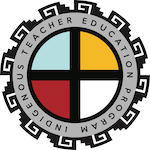Mission

In Arizona, current issues of teacher pay and teacher turnover have created a high demand for Elementary school teachers. Due to the large proportion of Indigenous students in Arizona, ITEP has identified a need for Indigenous Elementary school teachers For Instance in the Baboquivri Unified School District in the Tohono O'odaham community, only 20% of teachers are Indigenous.
At Sacaton Elementary School in the Gila River Indian Community, 19% of the teaching staff is Indigenous and 16% are from the Gila River community. ITEP aims to combat this shortage of Indigenous Educators by supporting 14 Native American participants through the final 2 years of their Elementary Education teacher certification program at the University of Arizona.
ITEP pays for participant tuition, fees, books, a living stiped, and travel.
Many teacher education programs typically do not adequately prepared Indigenous Teachers to teach in Indigenous schools. Training teachers to address unique Tribal needs is essential and requires a shift in curriculum and teaching methods within teacher education programs. Within ITEP, Indigenous communities, Indigenous concerns, needs, languages, and knowledge systems are central to the process of Indigenizing teaching and teacher education.
Our teachers are trained to embed these components of tribal communities in their curriculum into existing traditional teaching methods and pedagogy. This change will preserve and privilege Indigenous knowledge systems while contributing to increasing the academic achievement of Native American students and bringing about positive social change in Indigenous communities.
Our program currently has 13 students who come from a range of Tribal communities from across Arizona. Each Nation has particular needs that can be addressed by teacher training initiatives that seek to prepare Indigenous teachers as nation builders. To employ “teachers as nation-builders” in a teacher education program requires strong partnerships and consistent dialogue with Tribal communities. If Indigenous knowledge systems and pedagogy are to be infused in courses and field experiences, creating sustainable Tribal partnerships is essential.

